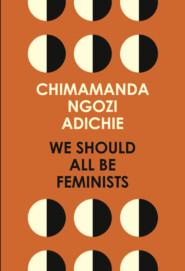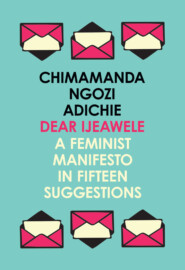По всем вопросам обращайтесь на: info@litportal.ru
(©) 2003-2024.
✖
Half of a Yellow Sun, Americanah, Purple Hibiscus: Chimamanda Ngozi Adichie Three-Book Collection
Автор
Год написания книги
2018
Настройки чтения
Размер шрифта
Высота строк
Поля
‘What are you talking about, for heaven’s sake?’ Olanna asked in English. Because she hardly ever spoke English to him, it sounded cold, distancing.
‘Mama used bad medicine on my master, mah. I saw flies in the kitchen. I saw her putting something in his food. Then I saw her rubbing something on Amala’s body, and I know it is the medicine that she used to tempt my master.’
‘Rubbish,’ Olanna said. It came out sounding like a hiss, rubbish, and Ugwu’s stomach tightened. She was different; her skin and clothes were crisper. She bent and flicked away a green aphid that had perched on her dress before she walked away. But she did not go around the house, past Master’s garage to her own car parked in front. Instead she went back into the house. He followed. In the kitchen, he heard her voice from the study, shouting a long string of words that he could not make out and did not want to. Then silence. Then the opening and closing of the bedroom door. He waited for a while before he tiptoed across the corridor and pressed his ear against the wood. She sounded different. He was used to her throaty moans but what he heard now was an outward, gasping ah-ah-ah, as if she was gearing up to erupt, as if Master was pleasing and angering her at the same time and she was waiting to see how much pleasure she could take before she let out the rage. Still, hope surged inside Ugwu. He would cook a perfect jollof rice for their reconciliation meal.
Later, when he heard her car start and saw the glaring headlights near the bush with the white flowers, he thought she was going to collect a few things from her flat. He set two places for dinner but did not serve the food because he wanted to keep it warm in the pot.
Master came into the kitchen. ‘Do you intend to eat alone today, my good man?’
‘I am waiting for madam.’
‘Serve my food, osiso!’
‘Yes, sah,’ Ugwu said. ‘Will madam come again soon, sah?’
‘Serve my food!’ Master repeated.
23 (#u3c1576f1-c916-57b7-bb43-a63c028a7109)
Olanna stood in Richard’s living room. Its austere emptiness made her nervous; she wished he had pictures or books or Russian dolls that she could look at. There was only a small photo of an Igbo-Ukwu roped pot on the wall, and she was peering at it when Richard came out. The uncertain half smile on his lips softened his face. She sometimes forgot what a handsome man he was, in that fair-haired, blue-eyed sort of way.
She spoke immediately. ‘Hello, Richard.’ Without waiting for his response and the lull that came with greetings, she added, ‘Did you see Kainene last weekend?’
‘No. No, I didn’t.’ His eyes avoided hers, focused on her glossy wig. ‘I was in Lagos. Sir Winston Churchill has died, you see.’
‘What happened was stupid of both of us,’ Olanna said and noticed that his hands were shaking.
Richard nodded. ‘Yes, yes.’
‘Kainene doesn’t forgive easily. It would make no sense at all to tell her.’
‘Of course not.’ Richard paused. ‘You had emotional problems, and I should not have – ’
‘What happened took two, Richard,’ Olanna said, and suddenly felt contempt for his trembling hands and pale shyness and the vulnerabilities he wore so openly knotted at his throat like a tie.
Harrison came in with a tray. ‘I am bringing drinks, sah.’
‘Drinks?’ Richard turned quickly, jerkily, and Olanna was relieved that there was nothing close or he would have knocked it over. ‘Oh, no, really. Would you like something?’
‘I’m just leaving,’ Olanna said. ‘How are you, Harrison?’
‘Fine, madam.’
Richard followed her to the door.
‘I think we should keep things normal,’ she said, before she hurried out to her car.
She wondered if she should have been less histrionic and given them both the chance to have a calm conversation about what happened. But it would have achieved little, digging up the dirt of yesterday. They had both wanted it to happen and they both wished it had not; what mattered now was that nobody else should ever know.
She surprised herself, then, when she told Odenigbo. She was lying down while he sat next to her on his bed – she thought of the bedroom itself now as his rather then theirs – and it was the second time they had slept together since she left. He was asking her to please move back to the house.
‘Let’s get married,’ he said. ‘Mama will leave us alone then.’
It may have been his smug tone or the flagrant way he continued to sidestep responsibility and blame his mother that made Olanna say, ‘I slept with Richard.’
‘No.’ Odenigbo looked incredulous, shaking his head.
‘Yes.’
He got up and walked to the wardrobe and looked at her, as if he could not be close to her at that moment because he was afraid of what he would do if he were. He took his glasses off and rubbed the bridge of his nose. She sat up and realized that distrust would always lie between them, that disbelief would always be an option for them.
‘Do you have feelings for the man?’ he asked.
‘No,’ she said.
He came back and sat next to her. He looked torn between shoving her off the bed and pulling her close, and then he got up abruptly and left the room. When she knocked later on his study door to say she was leaving, he did not respond.
Back in her flat, she paced up and down. She should not have told him about Richard. Or she should have told him more: that she regretted betraying Kainene and him but did not regret the act itself. She should have said that it was not a crude revenge, or a score keeping, but took on a redemptive significance for her. She should have said the selfishness had liberated her.
The loud knocking on her front door the next morning filled her with relief. She and Odenigbo would sit down and talk properly, and this time she would make sure that they did not circle each other without meeting. But it was not Odenigbo. Edna came in crying, her eyes swollen red, to tell her that white people had bombed the black Baptist church in her hometown. Four little girls had died. One of them was her niece’s schoolmate. ‘I saw her when I went back home six months ago,’ Edna said. ‘Just six months ago I saw her.’
Olanna made tea and sat next to Edna, their shoulders touching, while Edna cried in loud gasps that sounded like choking. Her hair did not have its usual greasy shine; it looked like the matted head of an old mop.
‘Oh, my God,’ she said, between sobs. ‘Oh, my God.’
Olanna reached out often to squeeze her arm. The rawness of Edna’s grief made her helpless, brought the urge to stretch her hand into the past and reverse history. Finally, Edna fell asleep. Olanna gently placed a pillow beneath her head and sat thinking about how a single act could reverberate over time and space and leave stains that could never be washed off. She thought about how ephemeral life was, about not choosing misery. She would move back to Odenigbo’s house.
They had dinner in silence the first night. Odenigbo’s chewing irritated her, his bulging cheek and the grinding motion of his jaw. She ate little and looked across often at her box of books in the living room. Odenigbo was absorbed in separating his chicken from the bone, and for once he ate all of his rice until his plate was clean. When he finally spoke, he talked about the chaos in the Western Region.
‘They should never have reinstalled the premier. Why are they surprised now that thugs are burning cars and killing opponents in the name of elections? A corrupt brute will always behave like a corrupt brute,’ he said.
‘He has the prime minister behind him,’ Olanna said.
‘It’s the Sardauna who’s really in charge. The man is ruling this country like his personal Muslim fiefdom.’
‘Are we still trying to have a child?’
Behind his lenses, his eyes looked startled. ‘Of course we are,’ he said. ‘Or aren’t we?’
Olanna said nothing. A foggy sadness overwhelmed her, thinking of what they had allowed to happen between them and yet there was the new excitement of freshness, of a relationship on different terms. She would no longer be alone in her struggle to preserve what they shared; he would join her. His certainty had been rocked.
Ugwu came in to clear the table.
‘Get me some brandy, my good man,’ Odenigbo said.
‘Yes, sah.’
Odenigbo waited for Ugwu to serve the brandy and leave before he said, ‘I asked Richard to stop coming here.’









